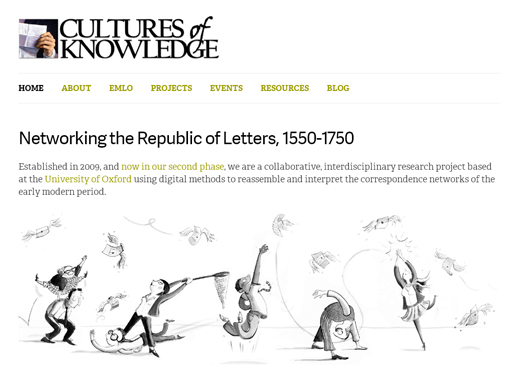 You’ve found our old website, which represents an archive of our activities during the first phase of Cultures of Knowledge, which ran between 2009 and 2012. To find out what we’re up to between now and the end of 2014, and to stay up to date with all things CofK, please visit our shiny new site. See you on the other side!
You’ve found our old website, which represents an archive of our activities during the first phase of Cultures of Knowledge, which ran between 2009 and 2012. To find out what we’re up to between now and the end of 2014, and to stay up to date with all things CofK, please visit our shiny new site. See you on the other side!
Cultures of Knowledge Has Moved!
CFP: Translation and the Circulation of Knowledge in Early Modern Science
Tags: History of Scholarship, History of Science, Networks, Translation
Paper proposals are invited for a one-day colloquium on Translation and Translators in the Circulation of Knowledge in Early Modern Science, which will take place at London’s Warburg Institute on Friday 28 June 2013. The event ‘will explore the role of translation in early modern science, providing a forum for discussion about translations as well as the translators, mediators, agents, and interpreters whose role in the intellectual history of the period remains ill defined and deserves greater attention’. Suggested topics include the philosophy and theory of translation; the ‘professional translator’; the function and use of translations; auxiliary languages; translation in learned correspondence; the readers of translations; and informal translations (adaptations, paraphrases).
The deadline for proposals for 25-minute papers and full panels is 28 February 2013. For further details and submission instructions, see the colloquium webpage.
Journal Special Issue: New Directions in Early Modern Correspondence
Tags: Archives, Centre for Editing Lives and Letters, Diplomatic History, England, Materiality, Networks, Seventeenth Century, Sixteenth Century, Union Catalogue
 Those seeking to balance the port and mince pies this holiday season with some state-of-the-art reflections on early modern epistolarity are in luck: the latest issue of Lives & Letters – the free online journal of UCL’s Centre for Editing Lives and Letters – is devoted to New Directions in the Study of Early Modern Correspondence.
Those seeking to balance the port and mince pies this holiday season with some state-of-the-art reflections on early modern epistolarity are in luck: the latest issue of Lives & Letters – the free online journal of UCL’s Centre for Editing Lives and Letters – is devoted to New Directions in the Study of Early Modern Correspondence.
Guest-edited by James Daybell and Andrew Gordon, and developing out of a conference held at Plymouth University in 2011, the issue features an introduction to the latest developments in the field (in which EMLO gets a name-check); eight case studies of particular correspondents and correspondence networks; and a spectacularly useful select bibliography on the manuscript letter in early modern England. All articles are free for download from the journal website. James also contributed to our 2011 seminar series (here’s the podcast), while his latest book on the material letter has just been reviewed by the IHR.
CFP: Intellectual Networks in the Long Seventeenth Century
Tags: Book History, Diplomatic History, Gender, Global, History of Scholarship, History of Science, Networks, Religion, Women
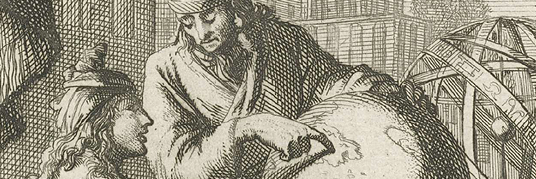 The Centre for Seventeenth-Century Studies at Durham University is seeking papers for a conference on Intellectual Networks in the Long Seventeenth Century (30 June–2 July 2013). The event – which will feature a keynote lecture from our own Howard Hotson – will ‘explore the emergence and consolidation of systems of intellectual and cultural exchange during the long seventeenth century, while assessing their lasting influence on the history of scholarship, literature, diplomacy, science, and religious communities’. Proposals are encouraged on (inter alia) erudite correspondence; academic networks; diplomacy; literary circles; intellectual exchange within religious communities; the book trade; women and intellectual exchange; and popular cultural exchange.
The Centre for Seventeenth-Century Studies at Durham University is seeking papers for a conference on Intellectual Networks in the Long Seventeenth Century (30 June–2 July 2013). The event – which will feature a keynote lecture from our own Howard Hotson – will ‘explore the emergence and consolidation of systems of intellectual and cultural exchange during the long seventeenth century, while assessing their lasting influence on the history of scholarship, literature, diplomacy, science, and religious communities’. Proposals are encouraged on (inter alia) erudite correspondence; academic networks; diplomacy; literary circles; intellectual exchange within religious communities; the book trade; women and intellectual exchange; and popular cultural exchange.
The deadline for proposals for 20-minute papers and full panels is 15 January 2013. For further details and submission instructions, head along to the conference webpage or download the flyer (pdf).
Journal Special Issue: Shaping the Republic of Letters
Tags: Communication, History of Scholarship, History of Science, Networks, Religion
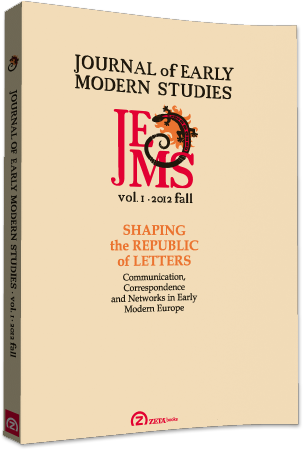 The new Journal of Early Modern Studies has launched with a special issue on Shaping the Republic of Letters: Communication, Correspondence, and Networks in Early Modern Europe.
The new Journal of Early Modern Studies has launched with a special issue on Shaping the Republic of Letters: Communication, Correspondence, and Networks in Early Modern Europe.
Edited by the Foundations of Modern Thought Research Centre at the University of Bucharest, and featuring our very own Howard Hotson on its Advisory Board, the new publication is billed as a ‘an interdisciplinary, peer-reviewed journal of intellectual history, dedicated to the exploration of the interactions between philosophy, science, and religion in Early Modern Europe’. The epistolary opener features seven contributions (as well as related review essays and book reviews) on particular correspondents and correspondence networks, including an article by Noel Golvers on Sino-European exchanges in the seventeenth and eighteenth centuries; Noel initiated our seminar series in 2010 with a wonderful paper on this topic (listen to the podcast). For full details and to order your copy, visit the journal webpage.
Presenting EMLO at Digital Transformations Moot
Tags: AHRC, Databases, Digitization, Union Catalogue, Visualization
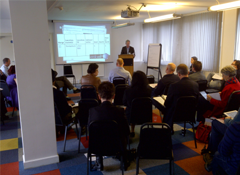
Howard mid-‘yack’
An outing to London last Monday when we presented Early Modern Letters Online at the Digital Transformations Moot, curated and funded by the AHRC. The day long event brought together digital humanists with thinkers and practitioners from other disciplines and sectors ‘to explore the possibilities of the Digital Transformations theme for new and exciting ways of working: to hack, to make, to break’.
The Moot did a great job of showcasing the very wide range of work (and attendant debates) currently being done at the intersection of the humanities and the technical, and in particular in highlighting and fostering new kinds of connections between digital technologies, arts and the humanities, and the creative and cultural industries (the latter being much more strongly represented than is usual at DH gatherings). It was also really interesting from the perspective of event design. Decked out in bracing, challenging terminology – debates were ‘moots’; delegates were ‘mootlings’; papers became ‘yacks’ – the day spread keynote lectures, panel discussions, software demos, and PechaKucha-style talks across multiple tracks and spaces in a kind of freeform digital smörgåsbord that rewarded curiosity and encouraged the creation of individual narratives and serendipitous connections between the sampled components. Further details on the Moot webpage, while the Twitter hashtag was #digitrans; videos of the various live streams will be posted the the webpage shortly.

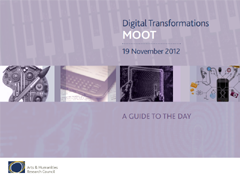

 Join
Join 